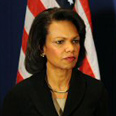
Rice: New Iran incentives, sanctions unlikely at this time
US Secretary of State reiterates concern over Iranian nuclear program, says US, UN must wait, see how Islamic Republic responds to latest sanctions
The United States will consider both fresh incentives or sanctions to persuade Iran to rein in its nuclear program but major changes are unlikely now, US Secretary of State Condoleezza Rice said on Friday.
"We will always continue to consider refreshing both tracks but this is not the time, I think, to expect major changes," Rice told reporters.
"We have just passed a (UN) Security Council resolution (imposing additional sanctions) and we will see how Iran responds," she added at a news conference with Germany's Foreign Minister Frank-Walter Steinmeier.
Senior officials from the major powers dealing with Iran – the United States, France, Germany, Britain, Russia and China – are due to meet on April 16 in Shanghai to discuss what the next steps should be against Iran.
China and Russia are pushing for greater incentives to get Iran to give up sensitive nuclear work that the West believes is aimed at building a nuclear bomb and Tehran says is aimed at increasing its civilian power capacity.
The UN Security Council has passed three rounds of limited sanctions against Iran, which has claimed in recent days it is installing 6,000 centrifuges to enrich uranium, which if highly refined can be used to make nuclear weapons.
Rice said she could not verify "one way or another" what Iranian President Mahmoud Ahmadinejad had said this week about apparent advances in Tehran's nuclear program.
But she said it would be better if the United Nations' atomic energy watchdog agency were granted more access to Iran's nuclear programs to verify what was happening.
Steinmeier said the major powers had maintained a "united front" in dealing with Iran, adding that European nations were considering complementary sanctions following the latest UN Security Council resolution.










